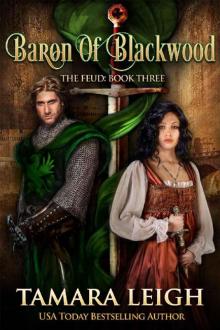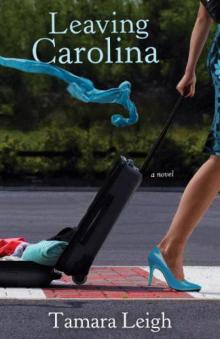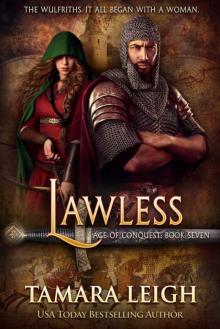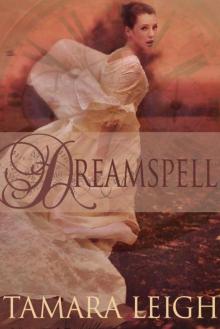- Home
- Tamara Leigh
LADY EVER AFTER: A Medieval Time Travel Romance (Beyond Time Book 2) Page 16
LADY EVER AFTER: A Medieval Time Travel Romance (Beyond Time Book 2) Read online
Page 16
King Henry lives. Do not forget with whom your loyalty lies.
The words glared at Catherine—words Hildegard would have spoken did she not number among the dead.
Catherine looked across her shoulder at the retreating lad who had delivered the missive. When she had asked who had enlisted him, he had said he did not know the name of the hooded man, only that his coin was good.
Returning her attention to the missive, she traced a finger over the curving line at the bottom. She had thought it merely a flourish, but it might be the letter S.
Could it be…? Nay, Severn was dead. Even so, someone was concerned with her loyalty.
Though a relatively warm day, she shivered. Had she lost sight of something she should not? Did her heart seek to blind her to what was owed her king? Even so, what of the lives spent on a cause that looked irretrievably lost?
She closed her eyes, and determinedly moving her thoughts away from the missive and the mass spoken for the dead, quickly and with no small relief settled her mind on Collier as if he were a refuge she had stumbled upon. He had been attentive and kind these past days, showing patience despite her struggle to reconcile her hate for the Yorkists with defeat.
And now he called to her.
She folded the missive and tucked it in her bodice. When she turned, the sight of him leading a bay stallion and a mottled black mare out of the stables, followed by a half dozen men also leading horses, nearly eased her foreboding. But she could not forget the missive, nor ignore the possibility the one who had sent it was nearby and would not be deterred by an armed escort.
“Methinks we ought to save the ride for another day,” she said as Collier paused to loop the stallion’s reins over a fence post.
Frowning, he led the mare forward, and when he stood over her, made no attempt to disguise his suspicion. “You know something I don’t?”
He was too handsome, she thought as she braved his gray gaze beneath gleaming black hair and above a jaw darkened by heavy stubble that was becoming a beard. “Nay, I but find I am suddenly tired.”
He jerked his head toward the stallion. “You could ride in front of me.”
Warmed by imaginings of his thighs trapping hers, she said, “’Twould not be proper.”
“Then we will have to wait until we are wed to enjoy that intimacy.” He stepped alongside the mare and beckoned. “Until then, you will have your respite.”
At her hesitation, he said, “Do not let our escort put you off, Lady Catherine. There are only six.”
What he implied—that her encouragement he bring as many as he liked had been a feint—hurt more than it should. And yet it was understandable considering the urgency with which she had implored him to take her from Strivling.
Hoping their ride would be uneventful, she allowed him to assist her in mounting the mare and took the reins he passed to her. Shortly, she followed him beneath the raised portcullis.
She was halfway across the drawbridge, their escort at her back, when she halted her mount. For fear of what she would see during the final days of the siege, she had avoided looking across the land outside the castle walls. Here lay the greatest evidence of Montagu’s treachery. The ground was torn, in places burned, and strewn everywhere were fragments of broken weapons, armor, and siege engines. But, blessedly, the men who had fallen were now interred.
“It’s in the past, Catherine—where it belongs.”
She looked to where Collier had turned his horse sideways.
According to the missive pressed against her bosom, it was not in the past. King Henry’s bid to take back his throne was not done. And it was expected she would continue to aid him.
“Catherine?”
Telling herself she could ride away her dread and fear, she set her gaze ahead so she would not have to look nearer upon the destruction, put heels to the mare, and sped past Collier. As the thunder of hooves followed, the wind freed her hair from her head covering, lifted the mantle back off her shoulders, and caused a thrill to rush through her.
Then Collier overtook her.
Her mare no match for the stallion, she expected him to surge ahead to demonstrate his male superiority, but he gentled the horse’s pace to match hers.
How different he was from other men, she once more mused as they raced side by side. And how unlike any enemy Hildegard had warned her against.
She looked sidelong at him. He moved as if one with the stallion, his body low and held close in. Never would she have expected such horsemanship from one who so poorly wielded a sword. Another curiosity.
In the company of their escort, who had surely been ordered to remain only as near as necessary, they rode until there was naught but the open land on three sides and the sea on the other. Then Collier veered toward the latter and reined in atop a bluff.
Bringing her mare alongside his, Catherine followed his gaze to the calm which had been violent and deadly three days past. Memories rolling in like the waves that had pounded Collier and her against the rocks, she turned aside the images and said, “I am surprised by your splendid horsemanship.”
He grinned. “In this, I have had training.”
“And yet your sword skill leaves much to be desired.”
“Afraid so.”
“A fighting man who knows horses, yet boasts only a passing facility with the sword. One schooled in letters and numbers, yet not the difference between the classes. Quite strange.”
He returned his gaze to the sea. “I’ve lived a life far different from this.”
“Where?”
After a long moment, he said, “A world away from here.”
Knowing somewhere beneath his somber words was the answer to the mystery of Collier Gilchrist, she said, “Is it beautiful there?”
“In places. We also have our classes and those who murder and steal without conscience. It’s just more carefully disguised—for the most part.”
“Where is this place?” she asked again.
And again, he didn’t answer. Was it something to be ashamed of?
“Do you believe in God, Catherine?”
Unprepared for the change of subject, she exclaimed, “Of course!”
“Because you’ve been told you should? Or do you truly embrace a higher being?”
The automatic response died on her lips. She saw Hildegard’s death and the deaths of the old baron and her betrothed. She saw herself on her knees in the bailey praying for a miracle not granted. Most clearly, she saw the men whose lives had been sacrificed in defense of Strivling. Did she believe in one who had not answered prayers carved out of her soul? She longed to, but why was He silent?
“Do you believe in Him, Collier?”
He urged his horse nearer and caught up her hand. “Until three days ago, not with certainty.”
The caress of his thumb across her knuckles made her heart flutter. “Why now?”
He jutted his chin at the sea. “When I lost you out there, I prayed as I’ve never prayed, and when I could stretch no farther without releasing the rock and following you down into the depths, your hand came into mine.”
Catherine recalled how impossible it had been for him to reach her. And yet his fingers had found hers—as real then as they were now.
“Though I know in future I’ll be tempted to question God’s existence,” he continued, “I’m determined that even if He never answers another of my prayers as I wish him to, I won’t forget He spared your life—and He has only to exist in that one prayer to exist in everything, even in seemingly unanswered prayers.”
Such as her prayers for success in what she had believed a just cause.
Chest tight, the backs of her eyes burning, she heard again the priest’s words.
That which hath been is now.
The first fall of Strivling, now the second?
That which is to be hath already been.
Meaning more deaths as Edward and Henry tugged England between them until it was torn to pieces?
And Go
d requireth that which is past.
What did that mean? That He had wanted this to happen again?
She looked up at Collier, and finding him watching her, sighed. “Methinks the Lord must be disappointed by how often I question Him amid all the horrible, cruel things He allows to happen.”
“If He is disappointed, Catherine, I would think there are few with whom He isn’t. And that our inconstancy doesn’t surprise Him. As for those things He allows to happen…”
She nearly asked why he believed God merely watched when it was clear His intervention was needed, but the answer came softly to her. “Free will,” she whispered.
Collier nodded. “I don’t believe we were meant to be waxed strings and well-oiled joints—slaves to one who raises the curtain on our stage. Little pain in that, I suppose, but also little joy.”
She smiled. “You have given this much thought.”
“I have.”
“Then you believe our strings are meant to tangle, our joints to squeak and bind?”
“As much as we allow them to.”
She lowered her gaze to her hand in his. That reminder that she lived, whereas others did not, made her feel every tangle, squeak, and binding. “I know He forgives if we ask it of Him, but…what if we cannot?”
“Why can’t you ask for forgiveness?”
She looked up, said in a rush, “I should have let Montagu in. ’Twas wrong to continue defending Strivling.”
“We all make mistakes. Many for the worse, some for the better. You couldn’t have known—”
“But I did.” She touched her breast. “In here. Yet still I sent men to die for a cause that was more mine than theirs.”
“Don’t you mean a cause that was more Hildegard’s than theirs?”
She stared. What did he know of the woman who was to have been her mother-in-law?
“Catherine, what did she ask of you? To be unyielding and hard, like her?”
Had he heard the talk of soldiers? Servants? Had Tilly told him?
“You feared failing her, am I right? So much that even after she died, you did what you knew she would have done.”
Defend Strivling to the death—as in her dreams before Collier stepped between Walther and her.
“I believe it was Hildegard who sent those men to their deaths, Catherine.”
She gave a sharp laugh. “You say I am not responsible?”
“Nay, I say you’re human. We all answer to someone, and the one to whom we answer doesn’t always look out for our best interests. In trying to make us over in their image, they mislead and manipulate us. When you came to Strivling, you were an impressionable girl, and Hildegard took advantage of that.”
Still…
He squeezed her hand. “What matters is where you go from here. That is what you will have to account for.”
She bit her lip. “What will you have to account for?”
His face shuttered. “One day I will tell you,” he said and swung out of the saddle and reached to her.
As she went into his arms, she could not help comparing them to Lambert’s that had trembled when he assisted her on and off a horse. Collier’s were strong, as if they could hold her forever.
He set her on her feet, and she walked to the bluff’s edge. The wind against her brow, she breathed in salty air. Though the sea had proven a terrible foe, she would miss it when she departed for Irondale which lay many leagues inland.
Of course, Tilly might be wrong, and Collier would be awarded Harden Castle. Or none at all. In which case, would he become a household knight to Morrow? If so, she who was to have been Lady of Strivling would wait on the woman whom Edmund Morrow wed.
Regardless, her life was much changed—even if the Lancasters took back their throne at the cost of thousands of more lives. Closing her eyes, she silently beseeched, Pray, forgive me, Lord, for allowing men to die for a cause You did not deem worthy of blessing.
Hands closed over her shoulders, and Collier drew her back against his chest.
She did not open her eyes lest vision lessened her ability to feel what he made her feel. That woman’s heart of hers again, but so be it. Even if only for the moment.
In the next, she turned. Seeing the firm line of his mouth was gentler, the gray of his eyes softer, she wondered if she might grow to love him. More, could he love again?
She set a hand on his jaw, pressed to her toes, and touched her mouth to his.
She felt surprise in his hesitation, then his arms came around her.
Though the sea was calm, a storm rose between them, threatening a different sort of drowning. His mouth and hands filling her senses and pulling her under was like breathing after having never breathed. If not for the rustle of parchment that saw her set back from Collier, she might never have sought the surface.
Realization struck, then fear, but before she could slap a hand to her bodice, he plucked the folded missive from it.
“What is this, Catherine?”
“Give it to me!” She grabbed at it, but as he moved it out of reach, beyond him she glimpsed their escort. Though distant enough they could not hear the words spoken between the lady and the knight, they certainly knew what had preceded them.
“Tell me,” Collier said.
She pressed her fingers into her palms. “’Tis personal. Naught that concerns you.”
He glanced at it. “We are going to be married.”
“Pray, give it to me.”
“I want to trust you.”
“Then do.”
A minute creaked by, and just when she was certain he would not respect her privacy, he extended the missive.
She snatched it and turned her back to him. But though she intended to return it to her bodice, something stopped her. She unfolded it and read it again.
Which path? The way of an awakening Catherine Algernon? Or the way of Hildegard—and more hate? And more prayers for forgiveness?
She swung around. Seeing Collier stalked to where he had left the horses, she ran. “I would have you trust me,” she said as she came alongside him.
He halted, searched her face, then took the missive and read it. “Who wrote this?”
“I know not.”
“Where did you get it?”
“A village boy delivered it ere we left the walls. I questioned him, but he said the one who paid him was hooded.”
Collier slowly nodded. “This is the reason you wanted to cancel our ride?”
“Aye, I feared whoever sent it might still be out here.”
“Whoever…” He folded the missive. “Possibly Walther.”
“The Yorkist mercenary? Why would he send such a missive?”
“You didn’t know he was first a Lancastrian?”
She caught her breath. “I did not.”
“For the promise of greater gain, he joined the Yorkists. My guess is that, finding little reward in supporting Edward, he has returned to the side of the Lancasters.”
And she had thought the man a model of vile Yorkist rule. “He tried to kill you.”
“And will likely try again since he believes that in finding favor with Morrow, I took from him what should have been his—Irondale.”
“Have you taken it from him?”
He secured the missive in the pouch on his belt. “We shall see. Now it’s time to return.” Shortly, he handed her into the saddle.
“You truly believe Edward will keep the throne of England?” she asked as he mounted his stallion.
“He will, which is as it should be.”
“But it belongs to—”
“No, Catherine. Edward is not the usurper. He simply takes back what the Lancasters stole from his family sixty years ago. He is more the rightful heir than Henry.”
She had heard the argument that Edward’s claim to the throne was superior to Henry’s and knew it had been upheld by the Lords in Parliament, but…
“Let’s go,” Collier said.
Once more trailed by their escort, they rode
side by side, slowing only when Strivling came into sight. And there, crossing the drawbridge into the bailey, was a retinue numbering two score.
CHAPTER NINETEEN
Edmund Morrow was returned. A baron.
Catherine stood beside Collier as the triumphant Yorkist took his place at the table. Was it true the Lancasters would never again rule England? she wondered amid the still of the castle folk who had minutes earlier learned the hated Montagu had been made Earl of Northumberland.
“Sir Collier,” Morrow called.
He stepped forward. “My lord.”
Morrow looked around the hall. “You have done well in my absence. Thus, I would reward you.”
Irondale Castle, Catherine thought. Soon she would return home, but how would she be received?
“What think you of keeping Harden Castle for me?”
From the stiffening of Collier’s shoulders, she could see he was as surprised by Morrow’s offer as she. “Harden Castle, my lord?”
“You have certainly proved yourself worthy.”
“I am flattered, but what of Irondale?”
Morrow’s eyebrows arched. “I paused at both castles on my journey here, and Harden is the finer of the two.”
It was true, Catherine conceded. And as with all men, Collier would wish the best.
“I thank you, my lord, but if you are to bestow so generous a gift on me, I would ask that it be Irondale.”
Catherine startled.
“For what reason?” Morrow asked.
“Lady Catherine’s family resides there.”
As Catherine further warmed to the man who was to be her husband, Morrow looked to her. From the bend of his brow, he was not keen on the idea, but then he smiled. “Have you tamed her, Gilchrist?”
She nearly stumbled where she stood and had to press her tongue to her palate to keep from speaking words that would not be well received.
“The lady and I have come to an understanding,” Collier said tightly.
The sparkle in Morrow’s eyes suggested he could guess at the nature of that understanding. “Very well, Sir Collier. Irondale Castle.”
“I thank you, my lord.”

 FEARLESS: Book Two: Age of Conquest
FEARLESS: Book Two: Age of Conquest BOUNDLESS: A Medieval Romance (AGE OF CONQUEST Book 6)
BOUNDLESS: A Medieval Romance (AGE OF CONQUEST Book 6) Lady Betrayed
Lady Betrayed Merciless
Merciless Nowhere, Carolina
Nowhere, Carolina Virgin Bride
Virgin Bride Blackheart
Blackheart Restless in Carolina
Restless in Carolina THE AWAKENING_A Medieval Romance
THE AWAKENING_A Medieval Romance Baron of Blackwood
Baron of Blackwood Leaving Carolina
Leaving Carolina HEARTLESS: A Medieval Romance (Age of Conquest Book 4)
HEARTLESS: A Medieval Romance (Age of Conquest Book 4) Baron of Godsmere
Baron of Godsmere Lady Of Eve
Lady Of Eve LAWLESS: A Medieval Romance (AGE OF CONQUEST Book 7)
LAWLESS: A Medieval Romance (AGE OF CONQUEST Book 7) Lady Of Fire AKA Pagan Bride
Lady Of Fire AKA Pagan Bride The Yielding (Age of Faith)
The Yielding (Age of Faith) The Redeeming: Book Three (Age of Faith)
The Redeeming: Book Three (Age of Faith) LADY UNDAUNTED: A Medieval Romance
LADY UNDAUNTED: A Medieval Romance THE RAVELING: A Medieval Romance (Age of Faith Book 8)
THE RAVELING: A Medieval Romance (Age of Faith Book 8) LADY EVER AFTER: A Medieval Time Travel Romance (Beyond Time Book 2)
LADY EVER AFTER: A Medieval Time Travel Romance (Beyond Time Book 2) Dreamspell
Dreamspell The Unveiling (Age of Faith)
The Unveiling (Age of Faith) THE RAVELING
THE RAVELING Splitting Harriet
Splitting Harriet Age of Faith 4 - The Kindling
Age of Faith 4 - The Kindling THE RAVELING_A Medieval Romance
THE RAVELING_A Medieval Romance Perfecting Kate
Perfecting Kate Misbegotten
Misbegotten THE VEXING: A Medieval Romance (AGE OF FAITH Book 6)
THE VEXING: A Medieval Romance (AGE OF FAITH Book 6) LadyOfConquest:SaxonBride
LadyOfConquest:SaxonBride